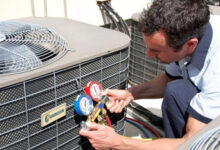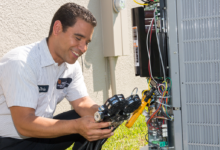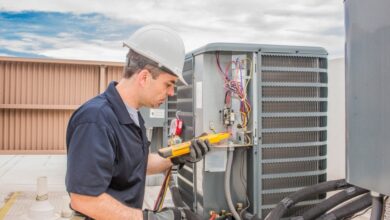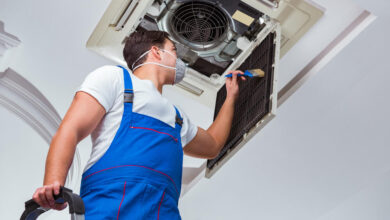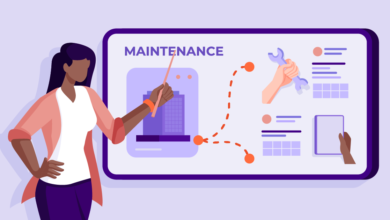AC Repair and Maintenance: A Comprehensive Guide to Keeping Your Home Cool and Comfortable
Sponsored Ads
Introduction
The air conditioner (AC) is an essential appliance in many homes, providing much-needed relief from the sweltering heat during the summer months. However, like any other piece of machinery, AC units require regular maintenance and occasional repairs to ensure optimal performance and longevity. This comprehensive guide will provide homeowners with a detailed understanding of AC repair and maintenance, empowering them to make informed decisions regarding their cooling systems.
Regular maintenance can help prevent costly repairs, extend the life of your AC unit, and ensure it operates at peak efficiency. By understanding the common signs of AC problems and the importance of professional maintenance, homeowners can proactively address issues before they escalate into more serious problems. This guide will delve into the specifics of AC repair and maintenance, providing step-by-step instructions for DIY tasks, tips for identifying professional contractors, and advice on scheduling regular maintenance to keep your home cool and comfortable year after year.
The Importance of Regular AC Maintenance
Regular AC maintenance is crucial for ensuring the longevity, efficiency, and reliability of your cooling system. By performing routine maintenance tasks, homeowners can identify potential problems early on and take steps to address them before they lead to costly repairs or system failure. Additionally, regular maintenance can help reduce energy consumption, as a well-maintained AC unit operates more efficiently, saving you money on your energy bills. In the long run, investing in regular AC maintenance can save you time, money, and stress, ensuring that your cooling system provides reliable comfort for years to come.
Just as a car needs regular oil changes and tune-ups to run smoothly, an AC unit requires routine maintenance to perform at its best. By scheduling annual or semi-annual maintenance appointments with a qualified technician, homeowners can ensure that their AC unit is inspected, cleaned, and serviced according to manufacturer recommendations. This proactive approach helps prevent unexpected breakdowns, extends the lifespan of the unit, and optimizes cooling performance, ensuring a comfortable and energy-efficient home environment.
Common Signs of AC Problems
Recognizing the signs of potential AC problems is essential for prompt diagnosis and repair, preventing minor issues from escalating into major breakdowns. Homeowners should be aware of the following common indicators of AC problems:
- Reduced cooling capacity: If your AC unit is struggling to cool your home effectively, it may be an indication of refrigerant leaks, clogged filters, or other underlying issues.
- Increased noise levels: Noisy operation, such as rattling, buzzing, or humming, can indicate loose components, worn bearings, or other mechanical problems.
- Higher energy bills: A sudden increase in your energy bills may be a sign of reduced AC efficiency due to dirty coils, clogged filters, or other issues.
- Unusual odors: Strange smells, such as burning or musty odors, can indicate electrical problems, mold growth, or other issues that require attention.
- Frequent cycling: If your AC unit turns on and off frequently, it may be an indication of faulty sensors, refrigerant leaks, or other issues.
- Frozen evaporator coil: A frozen evaporator coil can restrict airflow and reduce cooling capacity, often caused by dirty filters, low refrigerant levels, or other issues.
- Leaking refrigerant: Refrigerant leaks can compromise the cooling performance of your AC unit and pose environmental hazards, requiring prompt attention.
DIY AC Maintenance Tasks
While some AC repairs require professional expertise, there are several simple maintenance tasks that homeowners can perform on their own, saving time and money. These DIY tasks include:
- Cleaning or replacing air filters: Dirty air filters restrict airflow and reduce cooling efficiency, so it’s crucial to clean or replace them regularly, especially during peak cooling seasons.
- Cleaning coils: Condenser and evaporator coils can accumulate dirt and debris over time, reducing heat transfer and AC efficiency. Homeowners can clean these coils using a soft brush or a gentle spray from a garden hose.
- Checking refrigerant levels: Low refrigerant levels can impact cooling performance. Homeowners can use a refrigerant gauge to check the levels and add refrigerant if necessary, following the manufacturer’s instructions carefully.
- Clearing drain lines: Clogged drain lines can cause water leakage and other issues. Homeowners can clear these lines using a wet/dry vacuum or by pouring a vinegar solution down the drain.
- Tightening electrical connections: Loose electrical connections can lead to arcing and other electrical problems. Homeowners can inspect and tighten any loose connections, ensuring a safe and efficient electrical system.
When to Call a Professional AC Technician
While DIY AC maintenance tasks can help keep your unit running smoothly, there are certain situations when it’s essential to call a qualified professional. These situations include:
- Major repairs: Complex repairs, such as refrigerant leaks, compressor failures, or electrical problems, require specialized knowledge and tools, making it unsafe and unwise for homeowners to attempt them.
- Electrical issues: Any electrical problems with the AC unit, such as loose connections, faulty wiring, or blown fuses, should be addressed by a qualified electrician.
- Refrigerant handling: Refrigerant is a hazardous substance that requires proper handling and disposal. Homeowners should never attempt to handle refrigerant without the necessary training and certification.
- System replacement: If your AC unit is old, inefficient, or beyond repair, it may be time to consider a system replacement. A qualified technician can assess your needs and recommend the best replacement options.
- Annual maintenance: While homeowners can perform basic maintenance tasks, annual maintenance should be performed by a qualified technician to ensure thorough inspection, cleaning, and adjustments.
Choosing a Qualified AC Technician
When selecting an AC technician, it’s important to consider the following factors:
- Licensing and certification: Ensure the technician is licensed and certified by relevant regulatory bodies, demonstrating their expertise and adherence to industry standards.
- Experience and reputation: Look for technicians with a proven track record of success, positive customer reviews, and a strong reputation in the industry.
- Insurance and guarantees: Verify that the technician is fully insured and offers guarantees on their workmanship and materials, providing peace of mind and protection.
- Availability and response time: Consider technicians who are available when you need them, especially during peak seasons or emergency situations.
- Cost and transparency: Get clear estimates for repairs or maintenance before agreeing to any work, ensuring transparency and avoiding unexpected expenses.
Scheduling Regular AC Maintenance
Regular AC maintenance is crucial for ensuring optimal performance, preventing costly repairs, and prolonging the lifespan of your cooling system. Here’s how to schedule and maintain a regular maintenance routine:
- Frequency: Aim for annual or semi-annual maintenance appointments, depending on your AC unit’s usage and the manufacturer’s recommendations.
- Timing: Schedule maintenance before the peak cooling season to ensure your AC unit is ready for the increased demand.
- Scope of maintenance: During a maintenance appointment, the technician will typically perform a thorough inspection, cleaning, and adjustment of the AC unit, including checking refrigerant levels, cleaning coils, and tightening connections.
- Records: Keep a record of all maintenance appointments, including the date, services performed, and any recommendations made by the technician.
- Benefits: Regular maintenance provides numerous benefits, including improved cooling performance, reduced energy consumption, fewer repairs, extended system lifespan, and increased home comfort.
Conclusion
By understanding the importance of AC repair and maintenance, homeowners can make informed decisions to keep their cooling systems operating efficiently and reliably. Regular maintenance can prevent costly repairs, extend the lifespan of your AC unit, and ensure a comfortable and energy-efficient home environment. If you encounter any AC problems or require professional maintenance, don’t hesitate to call a qualified technician to ensure the safety and longevity of your cooling system. Investing in regular AC repair and maintenance is an investment in your home’s comfort, energy efficiency, and peace of mind.
Remember, a well-maintained AC unit not only provides reliable cooling but also contributes to a healthier indoor environment by reducing allergens and pollutants. By following the tips and advice outlined in this guide, you can ensure that your AC system operates at its best, providing you with years of cool and comfortable living.
Disclaimer: The information provided in this guide is for general informational purposes only and does not constitute professional advice. Always consult with a qualified AC technician for specific advice and services related to your cooling system.
| Task | Frequency | Recommended By |
|---|---|---|
| Clean or replace air filters | Monthly during peak cooling season | Homeowner |
| Clean coils | Annually or semi-ann |



